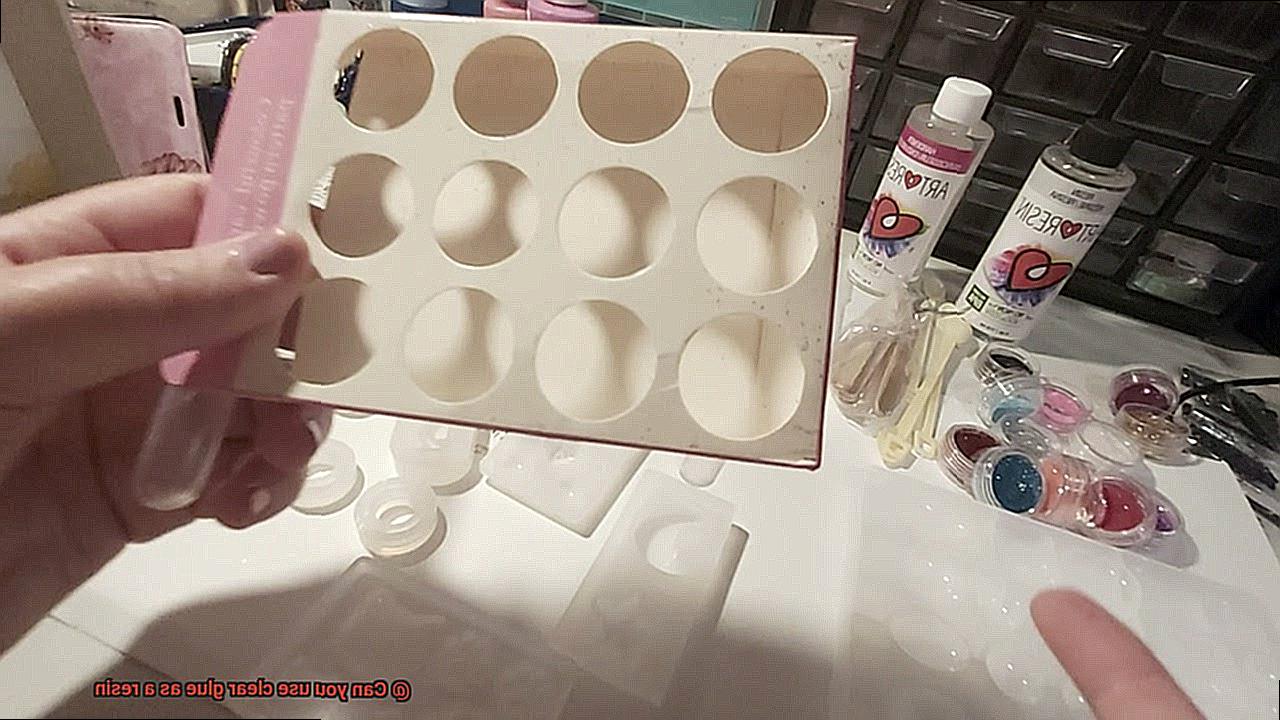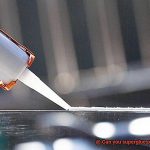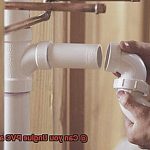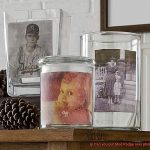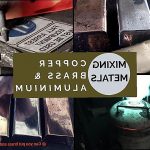Ever wondered if clear glue can be used as a resin? Well, get ready to step into the enchanting world of this DIY marvel.
Clear glue, the go-to for arts and crafts, might not be your first resin choice. But guess what?
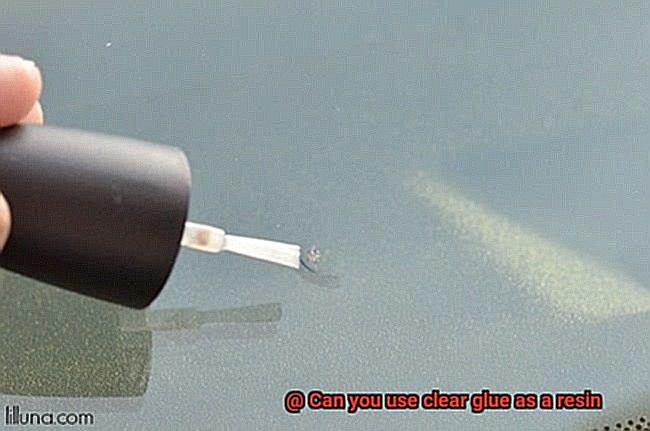
It’s becoming increasingly popular among creative enthusiasts who want an affordable alternative. And believe it or not, clear glue offers surprising perks too.
So, whether you’re a craft connoisseur or a pro artist, let’s dive into the endless possibilities of using clear glue as a resin substitute.
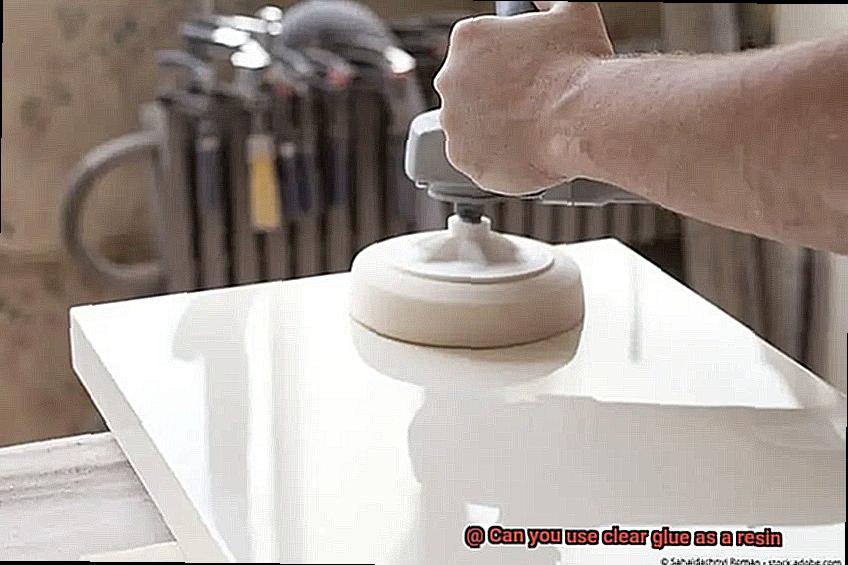
What is Resin?
Contents
- 1 What is Resin?
- 2 What is Clear Glue?
- 3 Differences Between Resin and Clear Glue
- 4 Advantages of Using Clear Glue as a Substitute for Resin
- 5 Disadvantages of Using Clear Glue as a Substitute for Resin
- 6 Curing Processes for Clear Glue and Resin
- 7 Suitable Projects for Clear Glue as a Substitute for Resin
- 8 Conclusion
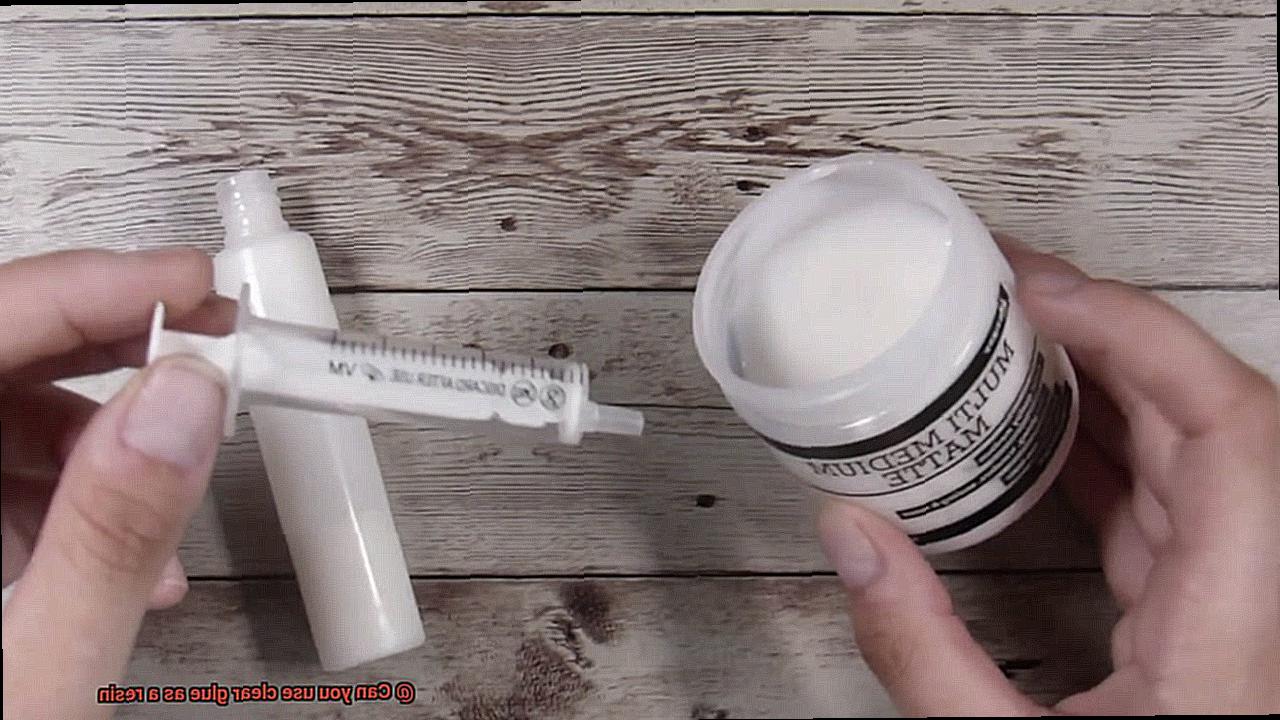
Resin, derived from trees through a process called resin tapping, is a versatile and widely used material that has found applications in various industries. Produced by trees as a defense mechanism against insects, fungi, and other external threats, resin appears as a sticky and viscous substance in its natural form. Its color can range from transparent to amber or dark brown, depending on the tree it is obtained from. Humans have been utilizing resin for thousands of years for purposes such as adhesives, varnishes, and coatings.
At its core, resin is composed of organic compounds called terpenes. These compounds not only give resin its distinct fragrance but also make it highly resistant to moisture and heat. This unique composition has led to its use in the manufacturing of paints, coatings, adhesives, plastics, and composites across industries such as construction, automotive, electronics, and art.
Two commonly known types of resin are epoxy resin and polyester resin. Epoxy resin is created by chemically reacting a resin with a hardener. This produces a durable and rigid material known for its excellent adhesive properties, high strength, and resistance to chemicals and weathering. Polyester resin, on the other hand, is formed by combining a liquid monomer with a catalyst to trigger a chemical reaction resulting in the formation of a solid material. This type of resin is often used in fiberglass production, boat building, and surfboard manufacturing.
It’s important to distinguish between clear glue and resin. While clear glue may share visual similarities with resin, it cannot be used as a substitute due to its different chemical composition. Clear glues are typically water-based and possess different properties compared to resins.
What is Clear Glue?
Its composition is primarily made from water and polyvinyl acetate (PVA), a synthetic polymer that gives the glue its adhesive properties. But what sets clear glue apart from other adhesives?
Firstly, clear glue can be found in different forms such as liquid or gel, making it versatile for various projects. Whether you need a thin layer or a thicker application, clear glue is adaptable to your needs. It is available in a range of sizes, from small bottles for intricate crafts to larger containers for extensive repairs.
Applying clear glue is a breeze. Just grab the bottle and squeeze it onto your desired surface. Its ease of use makes it ideal for anyone, from craft enthusiasts to DIY beginners. You can use clear glue on a wide range of materials, including paper, fabric, glass, plastic, and wood. Its compatibility with different surfaces allows for endless creative possibilities.
When it comes to drying time, clear glue doesn’t keep you waiting. Within minutes to a couple of hours, depending on the thickness and amount applied, this adhesive transforms into an invisible bond. This unique characteristic makes clear glue perfect for projects that require a discreet connection.
Speaking of projects, the uses for clear glue are vast. It is commonly employed in basic paper crafts like collages and construction paper projects. School assignments involving models or dioramas benefit greatly from the versatility of clear glue. Furthermore, attaching embellishments or sealing envelopes are effortless tasks with this adhesive.
Despite its impressive qualities, it’s important to note that clear glue does have some limitations. It may not be suitable for heavy-duty applications or situations where a stronger bond is required. Extreme temperatures, moisture, and exposure to certain chemicals can compromise its effectiveness. Therefore, it is crucial to consider the specific needs of your project before opting for clear glue.
Differences Between Resin and Clear Glue
Resin and clear glue are two adhesive substances that serve different purposes due to their distinct composition, properties, curing process, and applications.
Resin is a durable and strong adhesive commonly used in jewelry making, surface coating, and mold creation. It can be derived from natural sources, like plants, or manufactured through chemical processes. Resin offers higher resistance to heat and chemicals compared to clear glue and provides a glossy finish when cured. It is ideal for projects that require long-lasting durability and strength.
On the other hand, clear glue is a transparent adhesive that is flexible, easy to use, and suitable for bonding lightweight materials. It is typically made from synthetic materials such as polyvinyl acetate (PVA) or ethylene-vinyl acetate (EVA). Clear glue may not possess the same level of durability or resistance as resin but is widely used in arts and crafts projects, school assignments, and general household repairs.
One significant difference between resin and clear glue lies in their curing process. Resin cures through a chemical reaction called polymerization, which involves the hardening of the material over time. This process can be accelerated by heat or UV light. Clear glue, on the other hand, dries through the evaporation of its water or solvent content. The adhesive forms a bond once the water or solvent completely evaporates.
In terms of physical properties, resin tends to be thicker and more viscous compared to clear glue. It has a higher density and can create a glossy finish when cured. Clear glue, on the other hand, is typically thinner and more liquid-like in consistency. While it dries to a transparent finish, it may not have the same level of shine as resin.
The applications of resin and clear glue also differ significantly. Resin is commonly used for creating jewelry pieces, coating surfaces like countertops or tables, casting sculptures or figurines, and making molds for various crafts. Clear glue, on the other hand, is often used for bonding paper, cardboard, fabric, wood, plastic, and other lightweight materials together.
While clear glue may not be a direct substitute for resin in applications that require greater durability or heat resistance, it is still a useful adhesive in its own right. Its flexibility, ease of use, and transparency make it popular for various craft and DIY projects. Clear glue is readily available, affordable, and can be easily found in most craft stores or online.
Advantages of Using Clear Glue as a Substitute for Resin
Advantages of Using Clear Glue as a Substitute for Resin:
- Cost-effective: Clear glue is significantly cheaper than resin, making it a cost-effective option for various projects. This is especially beneficial for individuals or businesses on a tight budget or those looking to save money on materials.
- Ease of accessibility: Clear glue is widely available in most craft stores, supermarkets, and online retailers. Unlike resin, which may require specific suppliers or specialized stores to purchase, clear glue can be easily obtained from local stores or ordered online with convenience. This accessibility makes it a practical choice for those who may not have easy access to resin or prefer a more readily available option.
- Quick drying time: Clear glue dries much faster than resin, often within minutes. This is a significant advantage when working on time-sensitive projects or when multiple layers need to be applied within a short period. Resin, on the other hand, typically takes several hours or even days to cure completely.
- Versatility: Clear glue can be used on various surfaces such as glass, plastic, wood, and fabric. This makes it suitable for a wide range of craft projects, including jewelry making, decoupage, and mixed media art. Resin may have limitations in terms of its compatibility with certain materials or surfaces.
- Non-toxic options: Many clear glues available in the market are non-toxic and safe to use. This makes them suitable for projects involving children or individuals with sensitivities to harsh chemicals. Resin often contains toxic chemicals and requires proper ventilation and protective equipment during application.
- Easy clean-up: Clear glue is water-based and can be easily cleaned up with soap and water. This is in contrast to resin, which requires solvents or specialized cleaning agents for removal. The ease of clean-up with clear glue can save time and effort, especially when mistakes or spills occur during the crafting process.
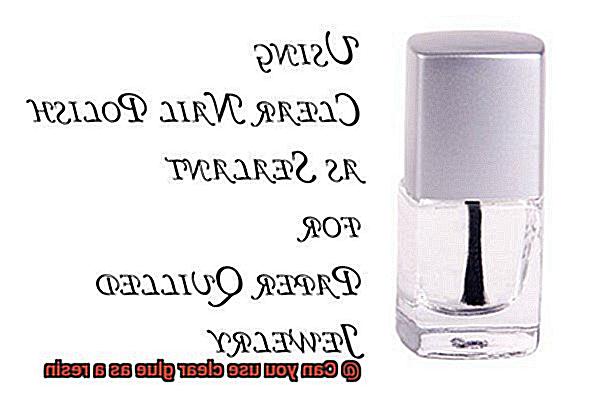
Disadvantages of Using Clear Glue as a Substitute for Resin
Using clear glue as a substitute for resin may seem like a cost-effective solution, but it comes with several significant disadvantages. Firstly, clear glue is not specifically designed to be used as a substitute for resin, which means it may lack the same properties and durability. This can lead to issues such as poor adhesion, reduced strength, and decreased longevity.
In addition, clear glue may not provide the same level of hardness and strength as resin. This can be problematic when using the material for applications that require a high level of durability, such as creating jewelry or coating surfaces that will be exposed to heavy wear and tear.
Furthermore, clear glue may not offer the same level of resistance to heat, chemicals, and UV rays as resin. Over time, this can result in discoloration, degradation, or even failure of the material. Resin is known for its excellent resistance to these factors, making it a more reliable choice for long-lasting projects.
Another disadvantage of using clear glue is that it may not offer the same level of clarity and transparency as resin. Resin is prized for its ability to provide a crystal-clear finish, while clear glue may result in a less desirable appearance or finish.
Moreover, resin has the advantage of self-leveling, meaning it can flow evenly and create a smooth surface without requiring additional intervention. Clear glue may not have the same self-leveling properties, making it more difficult to achieve a professional-looking finish.
Clear glue may also have a shorter working time or curing time compared to resin. This limitation can be particularly challenging for larger projects that require more time for manipulation or working with the material before it sets.
Additionally, while resin has excellent adhesion properties, clear glue may not adhere as well to certain surfaces or materials. This can result in poor bonding or adhesion, compromising the integrity of the project.
Furthermore, clear glue may be more prone to yellowing or becoming brittle over time, especially when exposed to sunlight or harsh environmental conditions. This can affect the longevity and appearance of the finished product.
Moreover, resin is known for its resistance to moisture and water damage, while clear glue may not offer the same level of protection. This makes clear glue susceptible to warping, swelling, or other damage when exposed to moisture.
Lastly, clear glue may be more difficult to sand, polish, or finish compared to resin. Achieving a professional-looking end result may require more effort and skill with clear glue.
Curing Processes for Clear Glue and Resin
The curing processes for clear glue and resin are essential steps in using these materials effectively. Clear glue typically cures through the process of evaporation, while resin cures through a chemical reaction called polymerization. Let’s take a closer look at each process:
Evaporation Curing for Clear Glue:
- Clear glue contains solvents that evaporate when exposed to air, transforming it from a liquid or gel-like state into a solid adhesive bond.
- The curing time for clear glue can vary depending on the type of glue used, ranging from a few minutes to a few hours.
- Proper ventilation is crucial during the curing process, as good airflow aids in the evaporation of solvents.
Polymerization Curing for Resin:
- Resin consists of two components: a resin and a hardener. When mixed together, they initiate a chemical reaction known as polymerization.
- Polymerization causes the resin to harden and cure over time.
- The curing time for resin can range from several hours to days, depending on factors such as the specific formulation of the resin and ambient conditions like temperature and humidity.
Factors Affecting Curing:
- Temperature: Higher temperatures accelerate the curing process, while lower temperatures slow it down. Follow the manufacturer’s recommended temperature range for optimal results.
- Humidity: High humidity levels can interfere with resin’s chemical reaction, leading to incomplete or uneven curing. Work in a well-ventilated area with moderate humidity levels.
- Surface Preparation: Clean, dry surfaces free from contaminants are crucial for proper adhesion and curing. Some resins may require additional treatment like sanding or priming.
- Application Thickness: Thicker layers may take longer to cure as the agents need to penetrate through the material. Follow manufacturer’s guidelines for optimal results.
- Post-Curing: Some clear glues and resins benefit from post-curing, subjecting the cured material to additional heat or UV exposure to enhance its strength and durability.
Suitable Projects for Clear Glue as a Substitute for Resin
Clear glue can be a versatile substitute for resin in a variety of craft projects. Whether you’re a beginner or on a budget, clear glue offers an affordable and accessible alternative. Here are some suitable projects where clear glue can be used as a resin substitute:
- Jewelry Making: Clear glue can be poured into molds or applied directly onto surfaces to create shiny and transparent pendants, earrings, and other accessories.
- Tabletop or Countertop Coating: Apply clear glue to surfaces like wood, glass, or cardboard for a glossy and protective coating. It’s perfect for small DIY projects or revamping old furniture and home decor items.
- Paperweights and Decorative Items: Pour clear glue into molds or embed objects within it to create visually appealing paperweights or decorative pieces. Preserve special mementos or create personalized gifts with ease.
- Faux Stained Glass Art: Apply multiple layers of colored glue onto glass or acetate sheets to achieve the look of stained glass. This opens up the art form to beginners and those on a budget.
- Artwork Coatings: Enhance the vibrancy and depth of paintings or artworks by applying several layers of clear glue for a smooth and glossy finish.
- Resin Jewelry Repairs: Clear glue can also be used to repair resin jewelry by filling in gaps or fixing broken pieces. It provides a strong bond and allows you to salvage your favorite pieces.
- Sealing Crafts: Use clear glue as a sealant for various crafts like decoupage, collage, or mixed media projects. It protects the artwork and adds a professional-looking finish.
- Filling Voids: Clear glue can fill gaps or voids in wood or other materials, giving them a polished and finished appearance.
Wt1qyYBG-BQ” >
Conclusion
To conclude, clear glue may resemble resin visually, but it falls short as a direct substitute due to its distinct chemical composition. Resin stands as a robust and resilient adhesive widely employed in jewelry making, surface coating, and mold creation. It boasts superior resistance against heat and chemicals compared to clear glue, leaving behind a lustrous finish once it cures. Conversely, clear glue serves as a transparent adhesive that offers flexibility, ease of use, and suitability for bonding lightweight materials.
While there are advantages to using clear glue instead of resin, such as its cost-effectiveness, widespread availability, and speedy drying time, significant drawbacks accompany this substitution. Clear glue may lack the same properties and durability as resin, leading to issues like feeble adhesion and diminished strength. It may not possess the level of hardness or resistance to heat, chemicals, UV rays, or moisture that resin provides. Additionally, achieving the same level of clarity or self-leveling properties found in resin can be challenging with clear glue.
In summary, while clear glue can prove useful in certain craft projects that do not demand the same durability or resistance as resin does, it cannot fully replicate the unique qualities offered by resin.

